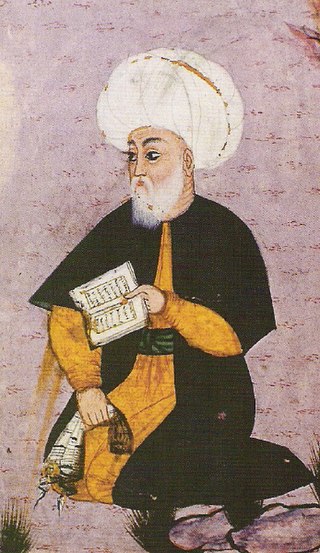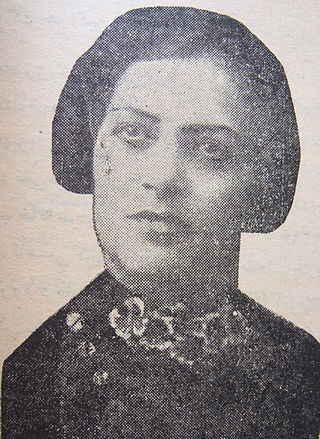Related Research Articles
Literature of Kashmir has a long history, the oldest texts having been composed in the Sanskrit language. Early names include Patanjali, the author of the Mahābhāṣya commentary on Pāṇini's grammar, suggested by some to have been the same to write the Hindu treatise known as the Yogasutra, and Dridhbala, who revised the Charaka Samhita of Ayurveda.

Seyid Ali Imadaddin Nasimi, commonly known as simply Nasimi, was a 14th- and 15th-century Hurufi poet who composed poetry in his native Azerbaijani, as well as Persian and Arabic languages. He is regarded as one of the greatest Turkic poets of his time and one of the most prominent figures in Azerbaijani literature.

Persian literature comprises oral compositions and written texts in the Persian language and is one of the world's oldest literatures. It spans over two-and-a-half millennia. Its sources have been within Greater Iran including present-day Iran, Iraq, Afghanistan, the Caucasus, and Turkey, regions of Central Asia, South Asia and the Balkans where the Persian language has historically been either the native or official language. For example, Rumi, one of the best-loved Persian poets, born in Balkh or Wakhsh, wrote in Persian and lived in Konya, at that time the capital of the Seljuks in Anatolia. The Ghaznavids conquered large territories in Central and South Asia and adopted Persian as their court language. There is thus Persian literature from Iran, Mesopotamia, Azerbaijan, the wider Caucasus, Turkey, Pakistan, Bangladesh, India, Tajikistan and other parts of Central Asia, as well as the Balkans. Not all Persian literature is written in Persian, as some consider works written by ethnic Persians or Iranians in other languages, such as Greek and Arabic, to be included. At the same time, not all literature written in Persian is written by ethnic Persians or Iranians, as Turkic, Caucasian, Indic and Slavic poets and writers have also used the Persian language in the environment of Persianate cultures.

Muhammad bin Suleyman, better known by his pen name Fuzuli, was a 16th-century poet who composed works in his native Azerbaijani, as well as Persian and Arabic. He is regarded as one of the greatest poets of Turkic literature and a prominent figure in both Azerbaijani and Ottoman literature. Fuzuli's work was widely known and admired throughout the Turkic cultural landscape from the 16th to the 19th centuries, with his fame reaching as far as Central Asia and India.

Rakhshandeh E'tesami, better known as Parvin E'tesami, was an Iranian 20th-century Persian poet.

Iranian studies, also referred to as Iranology and Iranistics, is an interdisciplinary field dealing with the research and study of the civilization, history, literature, art and culture of Iranian peoples. It is a part of the wider field of Oriental studies.
Shu'ubiyya was a literary-political movement which opposed the privileged status of Arabs within the Muslim community and the Arabization campaigns particularly by the Ummayads. The vast majority of the Shu'ubis were Persian.
Nur Yalman is a leading Turkish social anthropologist at Harvard University, where he serves as senior Research Professor of Social Anthropology and Middle Eastern Studies.

Sediqeh Dowlatabadi was an Iranian feminist activist and journalist and one of the pioneering figures in the Persian women's movement.
Ajami or Ajamiyya, which comes from the Arabic root for 'foreign' or 'stranger', is an Arabic-derived script used for writing African languages, particularly Songhai, Mandé, Hausa and Swahili, although many other languages are also written using the script, including Mooré, Pulaar, Wolof, and Yoruba. It is an adaptation of the Arabic script to write sounds not found in Standard Arabic. Rather than adding new letters, modifications usually consist of additional dots or lines added to pre-existing letters.

Gustave Edmund von Grunebaum was an Austrian historian and Arabist.
Bernadette Andrea is a professor in the Department of English at the University of California, Santa Barbara. She is also a core faculty in the Center for Middle East Studies, an affiliate faculty in the Comparative Literature Program, and an affiliate faculty in the Department of Feminist Studies. She previously taught at the University of Texas, San Antonio, where she was the Celia Jacobs Endowed Professor in British Literature. She received her PhD from Cornell University. Her book on Women and Islam in Early Modern English Literature was published by Cambridge University Press in 2007. Other books include Travel and Travail: Early Modern Women, English Drama, and the Wider World, with Patricia Akhimie, The Lives of Girls and Women from the Islamic World in Early Modern British Literature and Culture, English Women Staging Islam, 1696–1707 (University of Toronto, Centre for Reformation and Renaissance Studies, 2012), and Early Modern England and Islamic Worlds, with Linda McJannet.
Michael Gregory Morony has been a professor of history at UCLA since 1974, with interests in the history of Ancient and Islamic Near East.
Laura Miller is an American anthropologist and the Ei'ichi Shibusawa-Seigo Arai Endowed Professor of Japanese Studies and Professor of History at the University of Missouri–St. Louis. She held various academic positions and jobs in both the United States and Japan before accepting this named chair in 2010.

Essays on Nima Yushij: Animating Modernism in Persian Poetry is a 2004 book edited by Ahmad Karimi-Hakkak and Kamran Talattof, in which the authors examine the question of poetic modernity in She'r-e Nimaa'i.
Alireza Korangy is an Iranian-American literary critic, philologist and linguist. He is currently faculty at the American University of Beirut. He was previously an Assistant Professor at the University of Virginia. Korangy also taught at the University of Colorado at Boulder. He is the editor-in-chief of the International Journal of Persian Literature and is known for his works on Persian poetry, Iranian and Semitic philology and linguistics, and folklore.
André Wink is an emeritus professor of history at University of Wisconsin, Madison. He is known for his studies on India and the Indian Ocean area, particularly over the medieval and early modern age. He is the author of a series of books published by Brill Academic, Oxford University Press, and Cambridge University Press on al-Hind – a term used in Arab history to refer to the Islamized regions in the Indian subcontinent and nearby regions.
Chitralekha Zutshi is a historian of Kashmir and an Associate Professor of History at the College of William and Mary, USA.
Constructivism presumes that ethnic identities are shapeable and affected by politics. Through this framework, constructivist theories reassesses conventional political science dogmas. Research indicates that institutionalized cleavages and a multiparty system discourage ethnic outbidding and identification with tribal, localized groups. In addition, constructivism questions the widespread belief that ethnicity inherently inhibits national, macro-scale identification. To prove this point, constructivist findings suggest that modernization, language consolidation, and border-drawing, weakened the tendency to identify with micro-scale identity categories. One manifestation of ethnic politics gone awry, ethnic violence, is itself not seen as necessarily ethnic, since it attains its ethnic meaning as a conflict progresses.

Leyla Rouhi is an Iranian-American literary scholar and Mary A. and William Wirt Warren Professor of Romance Languages at Williams College. She is known for her expertise on comparative literature.
References
- ↑ "Tributes". www.koausa.org.
- ↑ Grant, Philip (1 April 2013). "A Conversation with Modern Persian Poets, edited by Girdhari Tikku, Alireza Anushiravani and Janet Smarr". Middle Eastern Literatures. 16 (1): 111–113. doi:10.1080/1475262X.2013.775865. ISSN 1475-262X. S2CID 162277155.
- ↑ Tritton, A. S. (January 1973). "Islam and its cultural divergences: Studies in honor of Gustave E. von Grunebaum. Edited by Girdhari L. Tikku. pp. 256, 2 facsimiles, pl. Urbana, University of Illinois Press". Journal of the Royal Asiatic Society. 105 (1): 57–58. doi:10.1017/S0035869X00130461. ISSN 2051-2066. S2CID 161560338.
- ↑ Hamori, Andras (January 1974). "G. L. Tikku (ed.). Islam and Its Cultural Divergence (University of Illinois Press, Urbana–Chicago–London, 1971). Pp. 256. $8.50". International Journal of Middle East Studies. 5 (1): 116–117. doi:10.1017/S0020743800032839. ISSN 1471-6380. S2CID 163213714.
- ↑ Grant, Philip (1 April 2013). "A Conversation with Modern Persian Poets, edited by Girdhari Tikku, Alireza Anushiravani and Janet Smarr". Middle Eastern Literatures . 16 (1): 111–113. doi:10.1080/1475262X.2013.775865. ISSN 1475-262X. S2CID 162277155.